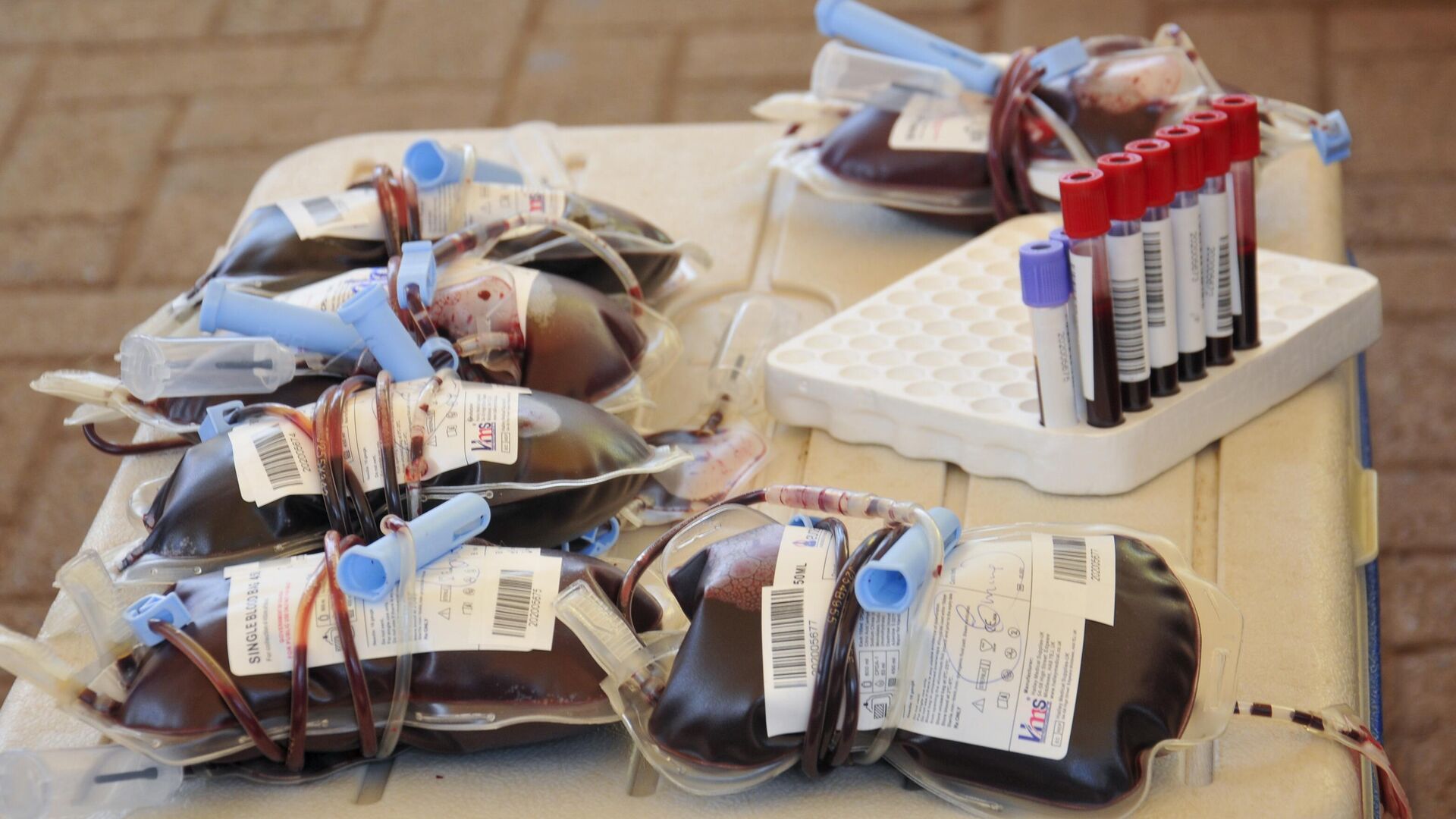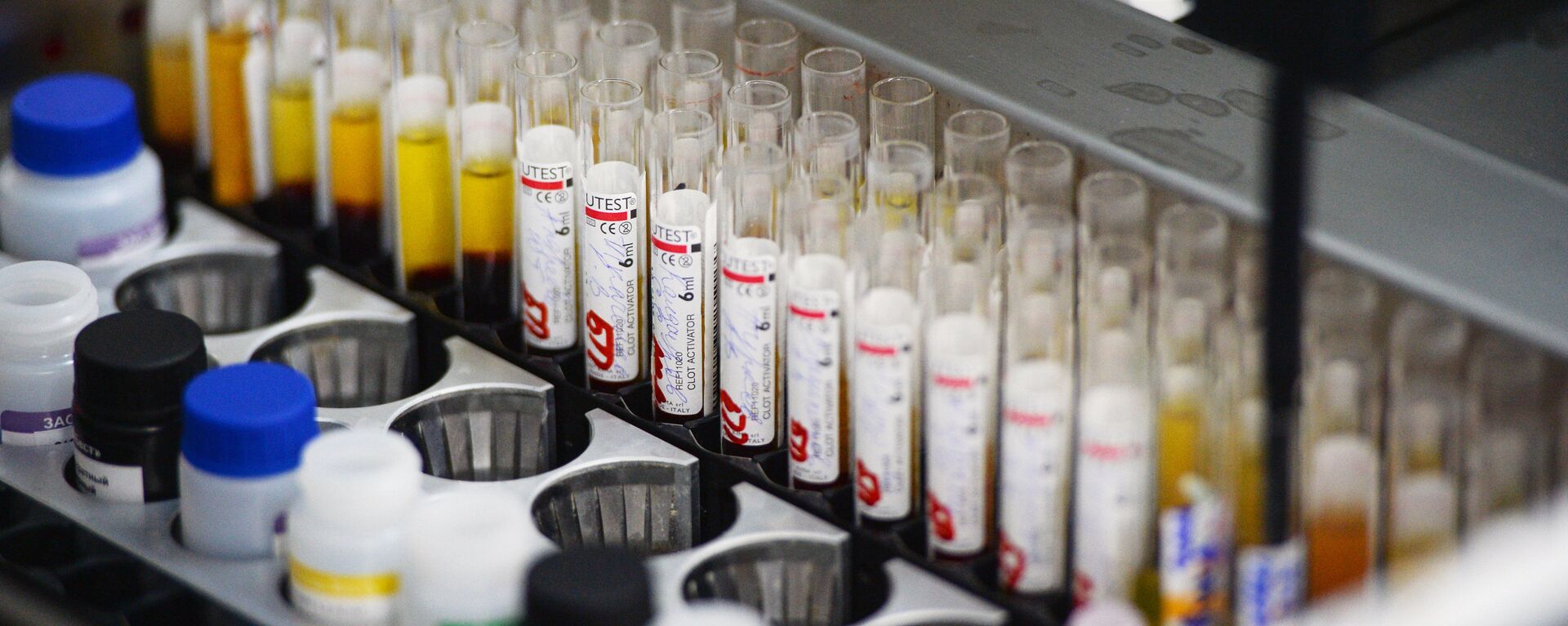https://en.sputniknews.africa/20240614/bridging-the-gap-on-blood-donor-day-blood-donation-in-africa-faces-challenges-but-hope-remains-1067052890.html
Bridging the Gap on Blood Donor Day: Blood Donation in Africa Faces Challenges, But Hope Remains
Bridging the Gap on Blood Donor Day: Blood Donation in Africa Faces Challenges, But Hope Remains
Sputnik Africa
With World Blood Donor Day celebrated on June 14, the need for increased blood donation remains a critical issue in conflict zones and developing countries... 14.06.2024, Sputnik Africa
2024-06-14T19:00+0200
2024-06-14T19:00+0200
2024-06-17T10:19+0200
sub-saharan africa
uganda
gaza
russia
world health organization (who)
donation
health
healthcare
west africa
north africa
https://cdn1.img.sputniknews.africa/img/07e8/06/0e/1067053162_0:274:3128:2033_1920x0_80_0_0_baf7a48febca965ad5da6b1bc5ad6b5a.jpg
Donating blood helps maintain a "healthy resilience, especially when it comes to war-torn zones," Dr. Emmanuel Obeagu, a senior lecturer in Hematology and Blood Transfusion Science at Kampala International University, Uganda, told Sputnik Africa in an interview.Dr. Obeagu underscored the global impact of blood shortages, highlighting the dire need for blood in war-torn areas like Gaza, Palestine, where trauma and injuries are rampant. He emphasizes that such crises highlight the global nature of the issue, requiring international collaboration and support.Dr. Obeagu further stressed the importance of voluntary, unpaid blood donation, asserting that it is the safest and most reliable source. He attributed the gap in Africa to a lack of awareness and campaigns, particularly in rural areas.Dr. Veronika Berdnikova, a Russian senior lecturer and head of the Department of Medical Physiology at the University of Dodoma in Tanzania, echoed a similar sentiment, explaining that the disparity in blood donation rates across Africa stems from factors such as limited infrastructure, inadequate human resources, lack of awareness, cultural beliefs, and logistical challenges.Despite these challenges, both experts highlight ongoing efforts to address the blood shortage and increase voluntary donation rates.The expert also tackled common misconceptions surrounding blood donation. Dr. Berdnikova addressed the myth that blood donation is a complex and risky process.The Russian expert also debunked the perception that blood donation is time-consuming, emphasizing that the entire process typically takes less than an hour.On this World Blood Donor Day, both experts urge individuals to donate blood and to actively participate in ensuring a healthy and resilient healthcare system for all.
https://en.sputniknews.africa/20230523/education-is-key-to-protect-people-from-hiv-in-africa-kenyan-expert-states-1059422898.html
uganda
gaza
russia
west africa
north africa
east africa
southern africa
central africa
Sputnik Africa
feedback@sputniknews.com
+74956456601
MIA „Rossiya Segodnya“
2024
Muhammad Nooh Osman
https://cdn1.img.sputniknews.africa/img/07e7/04/0a/1058467512_0:0:1280:1280_100x100_80_0_0_ec723833bcbfcaed2e21952965ad99e4.jpg
Muhammad Nooh Osman
https://cdn1.img.sputniknews.africa/img/07e7/04/0a/1058467512_0:0:1280:1280_100x100_80_0_0_ec723833bcbfcaed2e21952965ad99e4.jpg
News
en_EN
Sputnik Africa
feedback@sputniknews.com
+74956456601
MIA „Rossiya Segodnya“
Sputnik Africa
feedback@sputniknews.com
+74956456601
MIA „Rossiya Segodnya“
Muhammad Nooh Osman
https://cdn1.img.sputniknews.africa/img/07e7/04/0a/1058467512_0:0:1280:1280_100x100_80_0_0_ec723833bcbfcaed2e21952965ad99e4.jpg
uganda, gaza, russia, world health organization (who), donation, health, healthcare, west africa, north africa, east africa, southern africa, central africa, africa insight, africa in details
uganda, gaza, russia, world health organization (who), donation, health, healthcare, west africa, north africa, east africa, southern africa, central africa, africa insight, africa in details
Bridging the Gap on Blood Donor Day: Blood Donation in Africa Faces Challenges, But Hope Remains
19:00 14.06.2024 (Updated: 10:19 17.06.2024) Muhammad Nooh Osman
Writer/Editor
With World Blood Donor Day celebrated on June 14, the need for increased blood donation remains a critical issue in conflict zones and developing countries, particularly in sub-Saharan Africa. While the region has made progress in promoting voluntary, unpaid blood donation, a significant gap remains, with only 47% of blood needs being met.
Donating blood helps maintain a "healthy resilience, especially when it comes to war-torn zones," Dr. Emmanuel Obeagu, a senior lecturer in Hematology and Blood Transfusion Science at Kampala International University, Uganda, told Sputnik Africa in an interview.
Dr. Obeagu underscored the global impact of blood shortages, highlighting the dire need for blood in war-torn areas like
Gaza, Palestine, where trauma and injuries are rampant. He emphasizes that such crises highlight the global nature of the issue, requiring international collaboration and support.
"Of course, the only way to overcome such challenges is for us to have blood in adequate quantities," he stated. "It's an issue that the World Health Organization, so many NGOs, and so many donor agencies should come into play because a natural disaster or man-made disaster can happen anywhere."
Dr. Obeagu further stressed the importance of voluntary, unpaid blood donation, asserting that it is the safest and most reliable source. He attributed the gap in Africa to a lack of awareness and campaigns, particularly in rural areas.
"Africa and other developing countries need more campaigns and more awareness," he emphasized. "And they should take it not just in the developed, in the urban areas; they should take the message even to the rural areas."
Dr. Veronika Berdnikova, a Russian senior lecturer and head of the Department of Medical Physiology at the University of Dodoma in Tanzania, echoed a similar sentiment, explaining that the disparity in blood
donation rates across Africa stems from factors such as limited infrastructure, inadequate human resources, lack of awareness, cultural beliefs, and logistical challenges.
Despite these challenges, both experts highlight ongoing efforts to address the blood shortage and increase voluntary donation rates.
"Several initiatives and partnerships have been implemented in Africa to address this gap in the availability of blood and increase voluntary blood donation rates, and this includes the establishment of national blood transfusion services, capacity-building programs for health care workers, community-based blood donation drives, and advocacy campaigns to raise awareness about blood donation," Dr. Berdnikova told Sputnik Africa.
The expert also tackled common misconceptions surrounding blood donation. Dr. Berdnikova addressed the myth that blood donation is a complex and risky process.
"It is still widely believed that during donations there is a higher risk of contracting infections, but only sterile equipment is used throughout the donation process at authorized blood centers, so if we are talking about the authorized blood centers, we can't take any infectious disease," she clarified.
The Russian expert also debunked the perception that blood donation is time-consuming, emphasizing that the entire process typically takes less than an hour.
On this World Blood Donor Day, both experts urge individuals to donate blood and to actively participate in ensuring a healthy and resilient healthcare system for all.
"Donate blood; you save life. Don't hesitate to donate blood! Not only do you encourage your friends, but you also encourage your society and your community members [...] The more we donate, the more we save lives. The more lives we save, the higher the level of productivity we have in society, and the better the society will be for all of us," Dr. Obeagu concluded.



